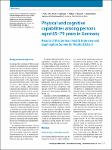Physical and cognitive capabilities among persons aged 65–79 years in Germany
Results of the German Health Interview and Examination Survey for Adults (DEGS1)
Fuchs, Judith
Busch, Markus
Gößwald, Antje
Hölling, Heike
Kuhnert, Ronny
Scheidt-Nave, Christa
In older age, physical and cognitive capabilities play an important role for independent living. For this reason, the German Health Interview and Examination Survey for Adults (DEGS1) included the Timed Up and Go test (TUG) and a chair-rise test, balance tests, a measurement of hand grip strength and the Digit Symbol Substitution Test (DSST) in order to representatively describe physical and cognitive performance of older people in Germany. Among 1,853 persons 65–79 years of age who came to the study centre more than 90% participated in the performance tests. The average time needed to complete the TUG and chair-rise tests were 10.7 and 11.8 s, respectively. On average, participants reached 3.9 of a maximum of 5 points in the balance tests (FICSIT4 protocol). Mean maximum grip strength was 32.3 kg. The mean number of correctly assigned symbols in the DSST was 43.8. In all functional capacity areas tested, performance declined with increasing age. There were differences by sex in the chair-rise test, hand grip strength and DSST. The objective measurement of physical and cognitive capabilities in DEGS1 contributes to describe the health status of older people with implications for health promotion and prevention.
No license information

